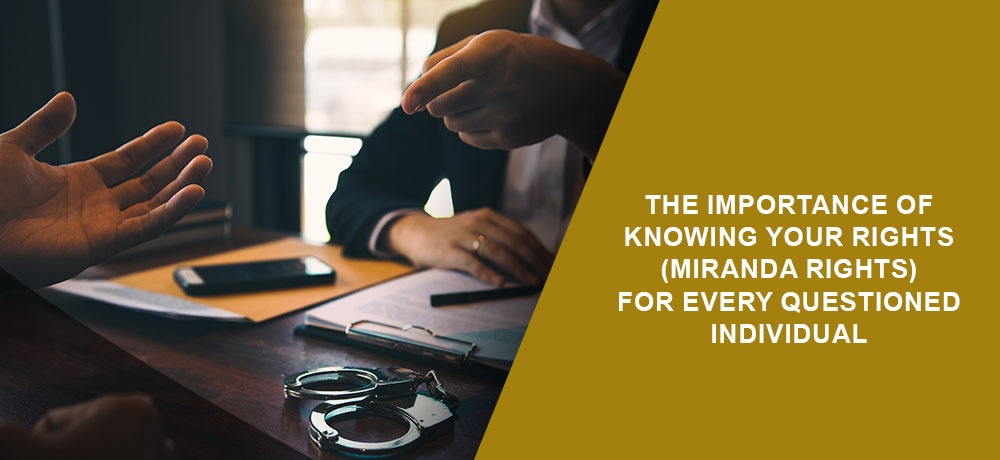The Importance of knowing your rights (Miranda Rights) for Every Questioned Individual

When a person finds themselves facing questioning by police officers, it is crucial to understand their rights, particularly their Miranda rights. These rights, which originated from a landmark U.S. Supreme Court decision in 1966, protect individuals from self-incrimination during any police interrogation. While Canada does not have an official version of the Miranda warning, the concept has been recognized and incorporated into Canadian law. In this article, we will explore the importance of Miranda rights for anyone questioned by police officers, focusing on the laws and precedents in Canada.
First and foremost, one must understand what Miranda rights entail. These rights ensure that a person has the right to remain silent during any police questioning. Importantly, this means that anything one says can be used against them in a court of law. They also have the right to legal representation. Being informed of these rights is crucial, as exercising them can protect individuals from self-incrimination and ensure a fair legal process.
In Ontario, the concept of Miranda rights is enshrined within the Canadian Charter of Rights and Freedoms. Section 10(b) of the Charter explicitly guarantees that "everyone has the right on arrest or detention... to retain and instruct counsel without delay and to be informed of that right." This provision ensures that individuals being questioned by police have the ability to consult with a lawyer and be informed of their rights before deciding how to proceed further.
Furthermore, Ontario's courts have consistently upheld the importance of these rights in various cases. For instance, in the landmark case of R. v. Sinclair, the Ontario Court of Appeal stressed the significance of Section 10(b). The court ruled that if the police fail to inform an accused person of their right to counsel, any subsequent statements made may be rendered inadmissible in court.
Additionally, the Supreme Court of Canada has emphasized the importance of promptly advising individuals of their rights. In R. v. Bartle, the court stated that an individual's right to counsel under Section 10(b) is "ineffective if it is not timely." This means that to ensure the full protection of their rights, individuals must be informed of their right to remain silent and have access to legal representation as soon as practical after their arrest or detention.
It is essential for individuals in Canada, to be aware of their rights during any police questioning. If a person is stopped by the police or taken into custody, they have the right to stay silent and avoid self-incrimination. Additionally, individuals have the right to consult with legal counsel before deciding how to proceed. These rights are guaranteed by the Charter of Rights and Freedoms and have been repeatedly affirmed by courts in Ontario.
The Importance of having proper legal representation:
1. Complex Legal Procedures: The legal process in criminal matters is intricate and involves various rules and procedures. Understanding and navigating these complexities without legal training can be extremely challenging. Self-represented individuals may lack the necessary knowledge to effectively present their case, conduct legal research, understand court rules, and adhere to relevant deadlines, potentially jeopardizing their defense.
2. Lack of Legal Expertise: Legal representation brings a wealth of knowledge and experience that is crucial in criminal cases. Lawyers are well-versed in the law, understand the legal strategy and tactics, and know how to present evidence convincingly. They are also familiar with various legal precedents and can therefore effectively argue for their clients' interests. Without legal expertise, self-represented individuals may struggle to present a compelling case, weakening their chances of a favorable outcome.
3. Emotional Impact: Criminal proceedings can be emotionally challenging, with individuals facing immense stress, anxiety, and fear. Having legal representation can alleviate some of these burdens by providing emotional support and guidance throughout the process. Lawyers are trained to provide objective advice and assist individuals in making informed decisions, ensuring that emotions do not impede their judgment and affect the case's outcome.
In Conclusion, understanding Miranda rights is vital for anyone facing questioning by police officers. In Canada the courts have consistently recognized and emphasized the importance of these rights. By being aware of these rights and exercising them, individuals can protect themselves during the legal process and ensure a fair and just outcome.
Call JSM Law for assistance in any Criminal Matter.